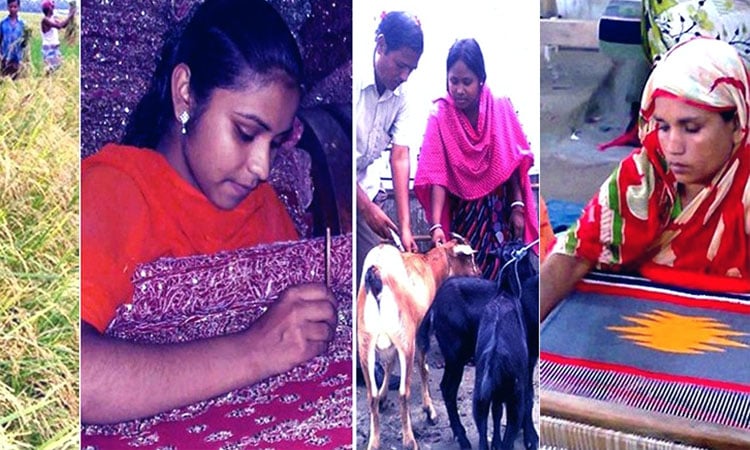News Flash
News Flash

By Md Mamun Islam
RANGPUR, Oct 25, 2025 (BSS) - The recurring seasonal unemployment crisis, locally known as 'Monga', has been effectively eradicated from the Rangpur region through sustained government initiatives and comprehensive poverty alleviation programmes
Even a decade and a half ago, the poor and working class people had to live miserable lives during this seasonal lean period of the year, they are now living a better life during the peak 'Monga' period of the months of 'Ashwin' and 'Kartik'.
"This success has been achieved as a result of the implementation of a continuous wide range of programmes towards the direction," said Dr Syed Shamsuzzaman, chairman of the research organisation 'Northbengal Institute of Development Studies'.
The successful implementation of the government's massive social safety-net programmes (SSNPs) and other efforts have effectively helped improve the living standards of the poor in overcoming 'Monga'.
Expanded cultivation of short duration Aman rice, Test Relief, Food for Work, Works for Taka, Vulnerable Group Development (VGD), Vulnerable Group Feeding (VGF) and many other projects played a vital role to ensure food security of the poor.
Rehabilitations of homeless people, providing training and micro-credits for income generating activities (IGAs), allowances and other programmes assisted the poor to improve livelihoods and overcome 'Monga' over the years.
"In fact, the word 'Monga' has become a historical term with its permanent exit from the region following successful implementation of massive social safety-net and other special programmes," Dr Samsuzzaman added.
Independence Award 2018 Medal (Food Security) winner Agriculturist Dr MA Mazid said that the increased cultivation of short-term Aman rice and the implementation of comprehensive SSNP have played a significant role in combating 'Monga'.
The early harvesting of short-duration Aman rice in the months of 'Ashwin' and 'Kartik' is generating huge jobs for the poor, which helps them to achieve better livelihoods by driving out 'Monga' from Rangpur region.
"Implementation of various programmes and engaging the poor with IGAs have effectively improved their socio-economic conditions, cutting poverty," Dr Mazid added.
Additional Director of the DAE for Rangpur agricultural region Md Sirajul Islam said farmers have cultivated Aman rice on 6,21,505 hectares of land in all five districts of the region this season.
"Of them, they have cultivated short duration varieties of Aman rice on over 62,000 hectares of land," he said.
Meanwhile, farmers have already harvested short duration Aman rice on around 20,000 hectares of land, creating huge jobs for the poor and farm-laborers during this seasonal lean period.
"After harvesting short duration Aman rice, farmers are cultivating early varieties of potato, mustard, vegetables and other winter crops on the same land, creating more and more jobs for farm-workers to assist them in tackling the lean period," Islam said.
Deputy Director Md Abdul Faruk of the Department of Youth Development said more than 40,000 unemployed youths got training and many of them got interest free loans to become self-reliant in Rangpur alone through IGAs over the years.
Deputy Director of Bangladesh Rural Development Board for Rangpur Shahidur Rahman Suman said implementation of their various projects have made many rural families, small and marginal farmers self-reliant through various IGAs to overcome extreme poverty.
Senior Officer of Rangpur Palli Sanchay Bank (PSB) Mahidul Islam said some 45,000 rural beneficiaries, including 30,000 women, have become solvent through IGAs through various IGAs with the PSB easy-term loan in Rangpur alone.
The beneficiaries got revolving loans, small and medium enterprise (SME) loans and skill enhancement training on fruit farming, pisciculture, rearing goat, sheep and cow, cow fattening, nursery and poultry.
Chairman of Betgari union in Gangachara upazila of Rangpur Mohaimin Islam Maruf said the SSNPs, small-scale enterprises, cottage industries, livestock and other IGAs and expanded cultivation of short duration Aman rice have eradicated 'monga' permanently.